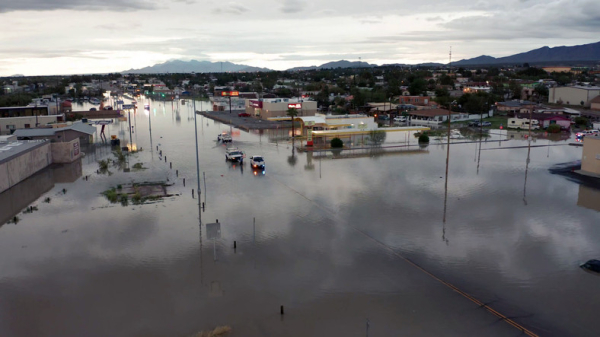
Heavy rains and sea level rise contribute to major flooding events that are one effect of climate change. Surging water rushing into buildings often causes immediate harms, such as drowning deaths, injuries sustained while seeking shelter or fleeing, and hypothermia after exposure to cold waters with no shelter or heat.
But long after news trucks leave and public attention moves on, flooding continues to affect communities in visible and less visible ways. Among the less visible threats is a higher risk of respiratory health problems like asthma and allergic reactions. Fortunately, you can take steps to minimize or avoid flooding, or to reduce respiratory health risks after flooding occurs.
How does flooding trigger respiratory health issues?
Flooding may bring water contaminated with toxic chemicals, heavy metals, pesticides, biotoxins, sewage, and water-borne pathogens into buildings. Afterward, some toxic contaminants remain in dried sediments left behind. When disturbed through everyday actions like walking and cleaning, this turns into microscopic airborne dust. Anything in that dried flood sediment — the toxic chemicals, the metals, the biotoxins — is now in the air you breathe into your lungs, potentially affecting your respiratory health.
Buildings needn’t be submerged during flooding to spur respiratory problems. Many homes we studied after Hurricane Ida suffered water intrusion through roofs, windows, and ventilation ducts — and some were more than 100 miles away from coastal regions that bore the brunt of the storm.
The growth of mold can also affect health
Another common hazard is mold, a fungal growth that forms and spreads on damp or decaying organic matter. Indoor mold generally grows due to extensive dampness, and signals a problem with water or moisture. Damp materials inside buildings following a flood create perfect conditions for rapid mold growth.
Mold can be found indoors and outdoors in all climates. It spreads by making tiny spores that float through the air to land in other locations. No indoor space is entirely free from mold spores, but exposure to high concentrations is linked with respiratory complications such as asthma, allergic rhinitis, and sinusitis. Thus, flooding affects respiratory health by increasing the risk of exposure to higher concentrations of mold spores outdoors and indoors.
For example, after Hurricane Katrina in New Orleans in 2005, the average outdoor concentration of mold spores in flooded areas was roughly double that of non-flooded areas, and the highest concentrations of mold spores were measured indoors. A study on the aftermath of Hurricane Katrina and the flooding in the UK in 2007 showed that water damage accelerated mold growth and respiratory allergies.
Children are especially vulnerable to health problems triggered by mold. All respiratory symptoms — including asthma, bronchitis, eye irritation, and cough — occurred more often in homes reporting mold or dampness, according to a study on the respiratory health of young children in 30 Canadian communities. Other research demonstrates that mold contributes to development of asthma in children.
What can you do to protect against the health harms of flooding?
Our research in New Orleans, LA after Hurricane Ida in 2021 identified common factors — both in housing and flooding events — with great impact on respiratory health. Preliminary results suggest two deciding factors in whether substantial indoor mold appeared were the age of a building’s roof and how many precautionary measures people took after flooding from the hurricane. The impact on respiratory health also varied with flood water height, days per week spent at home, and how many precautionary measures were taken after Ida swept through.
Informed by this and other research, we offer the following tips — some to tackle before flooding or heavy rains, and some to take afterward. While you may not be able to entirely prevent flooding from hurricanes or major storms, taking these and other steps can help.
Before seasonal storms, flooding, or heavy rains start: Protect against water intrusion
- Repair the roof, clean gutters, and seal around skylights, vent pipes, and chimneys to prevent leaks. These are some of the most vulnerable components of a building during storms and hurricanes.
- Declutter drains and empty septic tanks.
- Construct barriers and seal cracks in outer walls and around windows, to prevent heavy rain and floodwater from entering.
- Install a sump pump to drain water from the basement, and backflow valves on sewer lines to prevent water from backing up into the home.
After flooding or major rainstorms: Move quickly to reduce dampness and mold growth
The Environmental Protection Agency recommends limiting contact with flood water, which may have electrical hazards and hazardous substances, including raw sewage. Additionally:
- Minimize your stay in flooded regions (particularly after hurricanes) or buildings until they are dry and safe.
- Check building for traces of water intrusion, dampness, and mold growth immediately after flooding.
- Drain floodwater and dispose of remaining sediment.
- Remove affected porous materials. If possible, dry them outdoors under sunlight.
- Increase the ventilation rate by leaving all windows and doors open, or use a large exhaust fan to dry out the building as fast as possible.
- Use dehumidifiers in damp spaces such as basements.
- Upgrade the air filters in your HVAC system to at least MERV 13, or use portable air cleaners with HEPA filters to reduce your exposure to airborne mold spores.
What to do if you spot mold growth
- Wear a well-fitted N95 face mask, gloves, and rubber boots to clean.
- Clean and disinfect anything that has been in contact with water using soap, detergents, and/or antibacterial cleaning products.
- Dispose of moldy materials in sealed heavy-duty plastic bags.
Taking steps like these — before and after a major storm — goes a long way toward protecting your respiratory health.
Read Flooding Brings Deep Trouble in Harvard Medicine magazine to learn more about the health hazards related to floods.
About the Authors

Parham Azimi, PhD, Contributor
Dr. Parham Azimi is a research associate in the department of environmental health at the Harvard T.H. Chan School of Public Health, investigating the indoor environment’s impact on occupant health and wellness and strategies to improve … See Full Bio View all posts by Parham Azimi, PhD 
Joseph Allen, DSc, MPH, CIH, Contributor
Dr. Joseph Allen is an associate professor in the department of environmental health at the Harvard T.H. Chan School of Public Health, and the director of Harvard’s Healthy Buildings Program. He is the coauthor of Healthy … See Full Bio View all posts by Joseph Allen, DSc, MPH, CIH


 Everyone who lives with inflammatory bowel disease (IBD) knows their illness has a major impact on daily life. Many people are diagnosed in their 20s or 30s, a time when we might hope for few health challenges.
Everyone who lives with inflammatory bowel disease (IBD) knows their illness has a major impact on daily life. Many people are diagnosed in their 20s or 30s, a time when we might hope for few health challenges.
